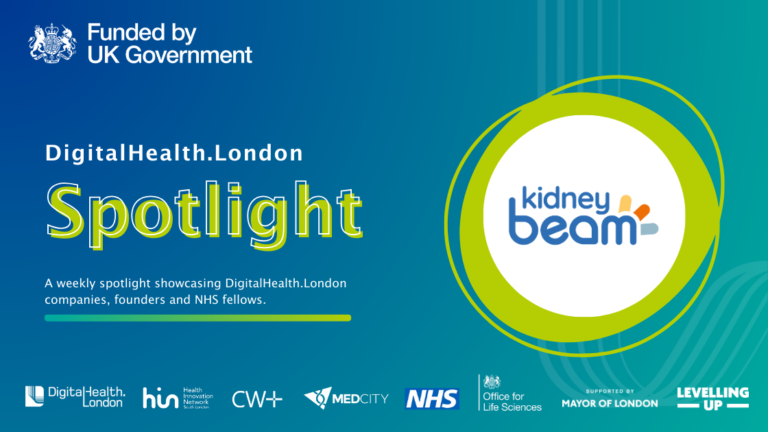Each week we spotlight one (or more) of our DigitalHealth.London businesses, founders or NHS fellows. Today, to commemorate World Kidney Day, we are delighted to introduce Kidney Beam, our current company DigitalHealth.London Accelerator.


What is the problem you are trying to solve and why is it important?
In the UK, 7.2 million people suffer from chronic kidney disease (CKD), more than 10% of the total population, costing the UK economy £7 billion a year. An estimated 28% of CKD patients are considered physically inactive, with this figure rising to 44% in patients with end-stage renal disease. There is significant evidence that exercise rehabilitation for people with kidney disease can result in a 21% delay in disease progression, a 33% reduction in mortality risk and could lead to saving £268 million a year on healthcare. Despite this, renal lifestyle management is currently fragmented and not part of routine care. This is because it is currently expensive to provide in-person services and there is not enough skilled labor or resources to provide them.
What is the solution you have developed and how can it help solve the problem?
Kidney bundle is a clinically proven online exercise, education and wellness platform developed for people living with chronic kidney disease. Created in partnership with King’s College Hospital, London, the platform offers live and on-demand classes and programs led by physiotherapists and exercise professionals trained in or living with CKD.
He offers:
- Kidney-specific content based on evidence
- Professional and peer support
- A personalized, data-driven experience
- Interoperability with platform partners
- 20 years of cutting-edge scientific intellectual property
- A virtual solution that delivers results comparable to in-person care
What is the history of your company?
Kidney Beam was born from a collaboration between Beam, a technology platform designed to encourage people with chronic health conditions to exercise, and King’s College Hospital. The product was launched in May 2020 as a rapid response to COVID-19.
Beam’s original co-founders, Katie Bell (a serial tech entrepreneur) and Pamela Scarborough (a former NHS physiotherapist), were joined by Dr Sharlene Greenwood (consultant physiotherapist at King’s College Hospital, president of the UK Kidney Association and the NHS Topol Digital. Fellow) to lead their expansion into kidney disease.
What successes have you had so far through successful pilots/trials/contracts?
Kidney Beam has been rolled out across England via all 8 kidney networks. They carried out a multicenter randomized controlled trial involving 340 participants which was recently published in the prestigious Lancet Digital Health log and showed that Kidney Beam participants had;
- Significant improvement in kidney disease quality of life score
- Significantly improved patient activation measurement
- Significantly improved physical function as measured by the 60-second sit-to-stand test
- 93% and 98% probability of being cost effective at £20,000 and £30,000 per QALY.
Overall, the study showed that the Kidney BEAM physical activity platform is an effective digital health intervention for improving the mental health-related quality of life of patients with chronic kidney disease. These findings could facilitate the integration of remote digital health interventions into clinical practice and offer a potential intervention worthy of study in other chronic diseases.
Kidney Beam works with some of the leading kidney charities including Kidney Research UK, the National Kidney Federation, Kidney Care UK, the UK Kidney Association and Kidney Wales. They also have testing sites in Ireland, the United States and Canada.
What are your future goals? What does success look like?
The NHSE Renal Clinical Reference Group is currently working on guidelines for the provision of exercise and rehabilitation, to make this care routine in renal units across the country. Kidney Beam will be well placed to provide exercise and rehabilitation to renal units in a cost-effective and evidence-based manner and therefore seeks to support renal units in the delivery of this care.
In addition to increasing program content, Kidney Beam is also considering international expansion, including hoping to establish a research study in the United States in collaboration with the National Kidney Foundation.
How has your time at the DigitalHealth.London Accelerator helped you achieve these goals?
The DigitalHealth.London Accelerator has allowed us to gain a lot of new knowledge about bringing a product to market and working effectively with the NHS to deliver health technology products. Having an NHS navigator allowed us to build a relationship with a mentor who helped us with introductions and good advice.
Do you have any advice for future digital health companies?
Start collecting clinical evidence as soon as possible and be sure to connect with a health economist so you are able to have the evidence base for your product.
Any requests for the public?
We are looking for investment partners to help us scale and reach go-live, as well as develop and commercialize the product. We’re looking for healthcare partners to help us get Kidney Beam into the hands of as many people as possible.
Kidney Beam is currently part of Cohort 7 of the DigitalHealth.London Accelerator programme.
THE DigitalHealth.London Accelerator The program is funded by the UK government through the UK Shared Prosperity Fund (UKSPF). It is delivered by the Health Innovation Network (HIN) South London in partnership with the Office of Life Sciences, CW+, Medicity, NHS England, the Mayor of London and the Leveling Up Fund.
For more information, please visit https://www.gov.uk/government/publications/uk-
Shared Prosperity Fund prospectus.




